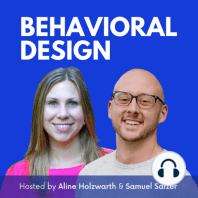58 min listen
Building Habits with Wendy Wood
ratings:
Length:
50 minutes
Released:
Mar 10, 2021
Format:
Podcast episode
Description
This episode is special. It features a conversation with the world-renowned habit researcher, Wendy Wood. Wendy has devoted the last 30 years to researching how habits work and recently published the fantastic book Good Habits, Bad Habits.
The episode is packed with insights, and we cover all things habits, from the difference between habits vs. routines to the impact of reward and context on habit formation. If you're curious to understand habits better, this episode is for you!
Links:
Wendy's website (where you can find here book) and her Twitter
Wendy's labs habit research
Habit Weekly Pro ?
Key points:
Changing attitudes is often not enough – even when we change people's attitude, their behavior doesn't always follow. And it's the behavior we care about, what they do.
The average person rarely distinguish between habits, behavior, intentions, beliefs and attitudes. "It's all all the same, all part of me and my decision making". It's important to differentiate these things as our brains consist of different systems that helps us accomplish different things.
There's a habit learning system designed specifically to pick up repetition of behaviour in a given context that generated some form of reward. We can think of reward as not money, but what makes you feel good. Habits are the context response associations that you form in memory, when you repeat a behaviour, often enough for the for it to become automatic. Additionally, routines are simply sequences of habit.
We can can change people's attitudes and beliefs for short periods, but these changes can disappear once they go back to real life if we fail to change the system. We need to understand the broader influences on someone's behavior in order to design contextual cues and rewards that helps them respond in new ways long-term.
Timestamps:
00:16: Episode overview
01:33: Interview starts
02:00: Wendy details her background and how she got started researching habits
03:55: Differentiating habits and behavior
06:50: Distinguishing between routines and habits
08:10: The automaticity of bias associations compared to the automaticity of habits
10:50: Can one-off trainings really be used to create new habits
13:16: Changing day-to-day environments and systems to change habits
16:28: Sam tells an anecdote about the influence of context on habits
18:30: The temporal dynamic of habit activation
20:42: Recurring contextual associations with a habit
21:27: Internal states as context cues for habits
23:52: Incentivising habits with rewards
26:54: Case study: encouraging use of an office’s stairs over an elevator
29:40: Best way to incentivise new habits
33:57: How is frequency related to establishing a new habit
35:30: The generalisation of habits
37:10: Overrated vs Underrated
Having a car
Experience sampling
Behaviorism
The clean plate club
Paris
The marshmallow study
Sidewalks
Rituals
Mise en place
44:47: What bad habit has been Wendy’s greatest nemesis in her personal life
47:36: Concluding remarks
–––––
Timestamps & shownotes compiled by Keith Broni ?
The song used is Murgatroyd by David Pizzaro.
---
Send in a voice message: https://anchor.fm/behavioral-design-podcast/message
The episode is packed with insights, and we cover all things habits, from the difference between habits vs. routines to the impact of reward and context on habit formation. If you're curious to understand habits better, this episode is for you!
Links:
Wendy's website (where you can find here book) and her Twitter
Wendy's labs habit research
Habit Weekly Pro ?
Key points:
Changing attitudes is often not enough – even when we change people's attitude, their behavior doesn't always follow. And it's the behavior we care about, what they do.
The average person rarely distinguish between habits, behavior, intentions, beliefs and attitudes. "It's all all the same, all part of me and my decision making". It's important to differentiate these things as our brains consist of different systems that helps us accomplish different things.
There's a habit learning system designed specifically to pick up repetition of behaviour in a given context that generated some form of reward. We can think of reward as not money, but what makes you feel good. Habits are the context response associations that you form in memory, when you repeat a behaviour, often enough for the for it to become automatic. Additionally, routines are simply sequences of habit.
We can can change people's attitudes and beliefs for short periods, but these changes can disappear once they go back to real life if we fail to change the system. We need to understand the broader influences on someone's behavior in order to design contextual cues and rewards that helps them respond in new ways long-term.
Timestamps:
00:16: Episode overview
01:33: Interview starts
02:00: Wendy details her background and how she got started researching habits
03:55: Differentiating habits and behavior
06:50: Distinguishing between routines and habits
08:10: The automaticity of bias associations compared to the automaticity of habits
10:50: Can one-off trainings really be used to create new habits
13:16: Changing day-to-day environments and systems to change habits
16:28: Sam tells an anecdote about the influence of context on habits
18:30: The temporal dynamic of habit activation
20:42: Recurring contextual associations with a habit
21:27: Internal states as context cues for habits
23:52: Incentivising habits with rewards
26:54: Case study: encouraging use of an office’s stairs over an elevator
29:40: Best way to incentivise new habits
33:57: How is frequency related to establishing a new habit
35:30: The generalisation of habits
37:10: Overrated vs Underrated
Having a car
Experience sampling
Behaviorism
The clean plate club
Paris
The marshmallow study
Sidewalks
Rituals
Mise en place
44:47: What bad habit has been Wendy’s greatest nemesis in her personal life
47:36: Concluding remarks
–––––
Timestamps & shownotes compiled by Keith Broni ?
The song used is Murgatroyd by David Pizzaro.
---
Send in a voice message: https://anchor.fm/behavioral-design-podcast/message
Released:
Mar 10, 2021
Format:
Podcast episode
Titles in the series (54)
Self-Applied Behavioral Science with David Perrott by The Behavioral Design Podcast
